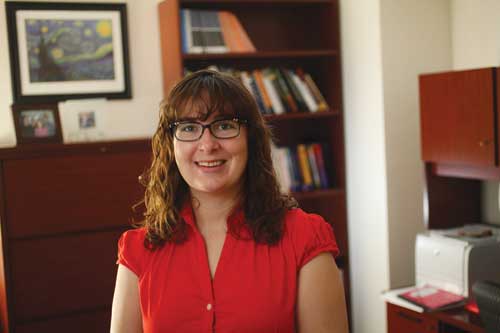Understanding autism
TCU’s Families, Autism and Child Emotion Studies Laboratory is helping unlock knowledge about mysterious disorder..

Naomi Ekas, an assistant professor of psychology, runs TCU’s Families, Autism and Child Emotion Studies Laboratory. (Photo by Carolyn Cruz)
Understanding autism
TCU’s Families, Autism and Child Emotion Studies Laboratory is helping unlock knowledge about mysterious disorder..
A boy, about 4 years old, is shown a big bin of toys filled with Legos, a Lightning McQueen car and a miniature farm.
An adult hands the boy a single block and tells him not to touch the toys until the adult returns.
How will the child respond? Will he cry and fixate on the bin of toys? Or will he eventually distract himself by doing something else?
The test is part of TCU’s Families, Autism and Child Emotion Studies Laboratory, run by Naomi Ekas, an assistant professor of psychology.
Ekas researches the social and emotional development of children with autism, as well as how the condition affects their families and the quality of the parents’ marriage.
Autism Spectrum Disorder is a neurodevelopmental disorder that now afflicts one of every 88 children, including one in 54 boys, according to the Centers for Disease Control and Prevention. It typically appears in the first three years of life and affects the brain’s normal development of social and communication skills.
Autism has no single, known cause, although researchers think genetics and environment may play a role.
“Autism is a puzzle,” Ekas says. “There is a lot we know, but there is a heck of a lot more we do not know.”
Ekas is spearheading two research projects which aim to improve our understanding of autism. Both projects are funded by start-up grants from TCU. One is evaluating the social and emotional functioning of young children, ages 3 to 5, with autism. Children with and without autism are given various tasks, such as solving three puzzles with varying degrees of difficulty, cleaning up toys or being forced to wait to play with toys.
Over the course of a year, researchers observe and record the childrens’ responses to the tasks, as well as their parents’ interaction.
Ekas is working with 50 families from the Fort Worth area and hopes to recruit 25 more.
“A lot of parents say that when their children who have autism get upset, they have a very difficult time calming themselves down,” Ekas said. “We are trying to help families develop effective strategies for handling stress.”
In a second project, Ekas is studying resiliency, coping abilities and quality of marriages among parents who have children with autism. Mothers and fathers will answer in-depth questionnaires and write in journals every night for two weeks. The research could help families cope with stress related to raising a child with autism.
“We know having a child with autism can lead to heightened levels of stress, depression and problems in marriage,” Ekas says. “We want to find the families who are doing well and determine what is making it work.
“Do they use religion? Are they spiritual? What is their support system?”
Ekas began studying autism in the early 2000s as an undergraduate at the University of California-Davis. At the time, relatively few people, including her, had even heard of the disorder or knew what it was. She was struck by the strength of the families.
“I just fell in love with these children and their families,” she says. “I could not imagine the patience it required to work with their children day after day, never even knowing if their child would make eye contact with them that day.”
In the past decade, awareness of autism has skyrocketed.
“Awareness is really important, but knowledge is much more important,” she says. “So many people still do not understand autism, and that needs to change.”

Your comments are welcome
Comments
Related Reading:
Campus News: Alma Matters
From Application to Admission
Amid an increasingly selective admission process, Heath Einstein leads the team that builds the TCU community of the future.
Campus News: Alma Matters
From the Chancellor
Chancellor Victor J. Boschini, Jr., identifies what made TCU and its sesquicentennial so memorable.